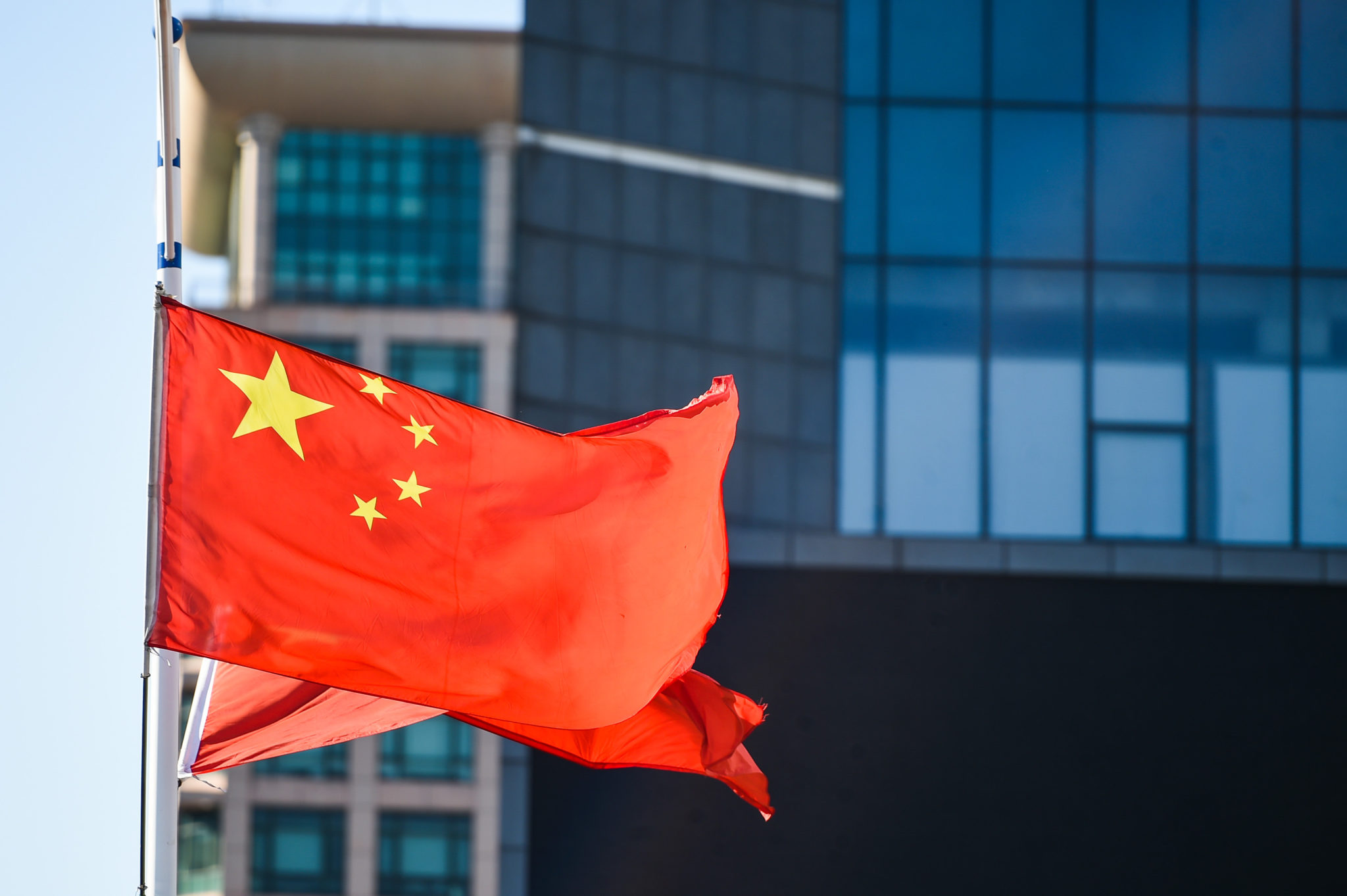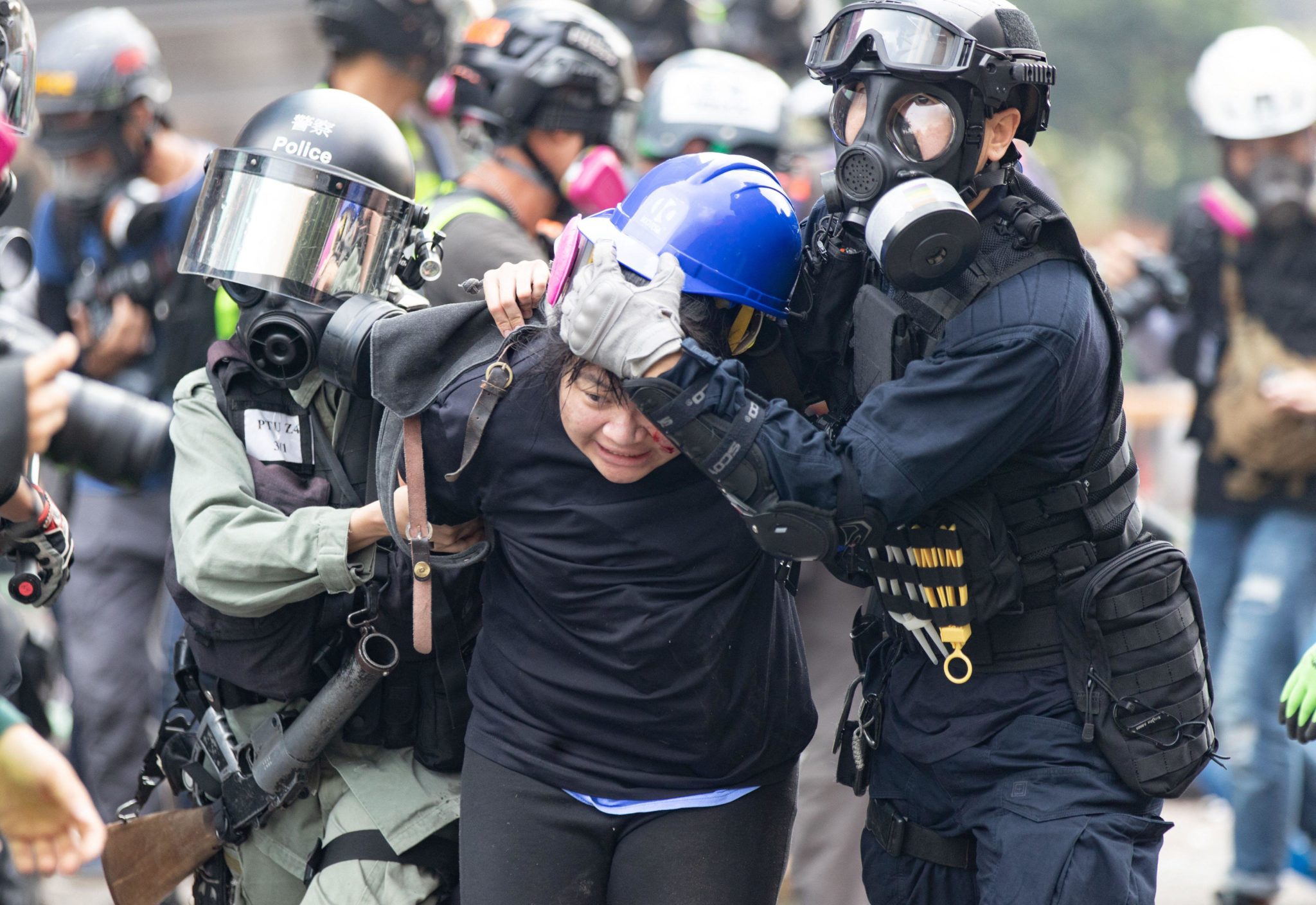Billy Kwan would probably never have set foot in Northern Ireland if it wasn’t for the Chinese Government.
The 53-year-old Hong Konger loves his homeland, but a mixture of its changing politics and a sense of adventure has led him to seek out a new life for his family in Belfast. In March last year Billy, his wife, Abee, and their three daughters packed their bags and emigrated nearly 10,000 kilometres to Northern Ireland.
“The primary reason I left Hong Kong is to let my children have different educational experiences in the UK,” Billy told Newstalk.
He intends to settle permanently in the province, citing as well his unease with the increased power of Beijing over his homeland.
“She [the Chinese Government] is totalitarian and people living there are dominated. But it’s still okay if freedom of speech and thought do not matter to you," he said.
 Red Chinese flags set up on a main road in Shenzhen city, south China's Guangdong province, 22 September 2019. (Photo by Liu Yujie - Imaginechina/Sipa USA)
Red Chinese flags set up on a main road in Shenzhen city, south China's Guangdong province, 22 September 2019. (Photo by Liu Yujie - Imaginechina/Sipa USA)In 1997 British rule formally ended in territory and control passed to China. However, under the ‘One Country, Two System’ principle, Hong Kong was promised she could retain her freedoms and unique way of life for 50 years.
For many Hong Kongers, that all ended in 2020 when Beijing imposed a wide-ranging new National Security law on the city. Dissent was criminalised, advocating for Hong Kong independence was banned and the right to protest was curtailed.
Those who break the law face a maximum sentence of life in prison and the British Government claim it is a clear breach of its agreement with Beijing.
Their response was to give millions of Hong Kongers the right to live and work in the United Kingdom. Hong Kongers with what is called British National Overseas (BNO) citizenship can now apply for a five-year visa to live and work in Britain - previously holders could only visit for six months - and it is this visa that has brought the Kwan family to Northern Ireland.
In the first nine months of 2021, some 67,304 BNO visas were granted by Britain’s Home Office. Relatively few chose Northern Ireland as their final destination. However, for the Kwan family, the province has two distinct advantages over other parts of the United Kingdom.
“There’s a lot of good grammar schools in Northern Ireland and also housing prices are relatively low,” he said.
So far the decision has paid off. Billy plays tennis regularly and has a job with the organisation Hong Kongers in Britain, which helps new arrivals adapt to their new lives.
“It’s not a very busy city like New York, Tokyo or Hong Kong,” he said.
“People here just like to enjoy their life. They don’t have to make a lot of money. I appreciate that Northern Ireland people understand the value of life.”
His children have settled into life in Belfast quickly and 11-year-old daughter Dora sounds indistinguishable from people who have lived in the city their whole lives.
“I think it’s really great,” Dora said.
“I really enjoy my school life and everyone’s really nice to me.”
 Art by the Kwan children has a distinctive Chinese influence.
Art by the Kwan children has a distinctive Chinese influence.Dora misses the shops in her old home but there is one thing about Northern Ireland that is particularly advantageous.
She said: “In Hong Kong we have a lot of homework and here there’s less, so there’s less stress for me.”
Hong Kong to Lisburn
The amount of schoolwork is also raised by another Hong Kong family, living in nearby Lisburn.
“My girls love here,” mum Cathy said.
“There’s actually not much homework. All the time it’s sport. She [her eldest] loves that! In Hong Kong the homework is huge for them.
“And she had to work until midnight but here maybe just for 30 minutes. It’s paradise and hell!”
Life in Lisburn is a family adventure for Cathy. She, her husband and two daughters live close by to her sister, Jessica, and their father. There is, however, one absence: their mother, who is pro-China, decided to stay behind in Hong Kong.
It is something the siblings strongly disagree with her about. Jessica refers to the Chinese Government as “evil” and recalls her feelings of shock and disgust watching coverage of the Tiananmen Square Massacre in 1989. Her ringtone is Do You Hear The People Sing? - a hit tune from the musical and film Les Misérables that has become something of a rebel tune for protestors in the territory who oppose Beijing rule.
 Police surround a university campus after pro-democratic protesters blocked the cross-harbour tunnel and the major road outside the campus. A citywide strike called for started Monday 11 November, 2019 brought parts of Hong Kong to halt as MTR stations closed and multiple roadblocks were erected. Photo by May James/ABACAPRESS.COM.
Police surround a university campus after pro-democratic protesters blocked the cross-harbour tunnel and the major road outside the campus. A citywide strike called for started Monday 11 November, 2019 brought parts of Hong Kong to halt as MTR stations closed and multiple roadblocks were erected. Photo by May James/ABACAPRESS.COM.For Cathy, the turning point was 2019 when a mob of over 100 people stormed a train station and began attacking commuters they suspected of being protestors.
But however far away Lisburn is from Hong Kong, the Chinese Government is something they still fear and neither sister felt comfortable allowing their surname to be published in this piece.
They chose Lisburn because they already had a friend living there. Otherwise, they did little research and Cathy only heard about the Troubles just before the family’s departure.
“I just learnt from a YouTube video, maybe one week before we flew here,” Cathy said.
The lampposts of the street where she lives are graced with numerous tatty Union Jacks and Ulster banners. But neither sister has yet developed a view on Northern Ireland’s constitutional future.
“To me, at the moment I have no idea about it,” Cathy admits.
“I just moved here and I have to learn how to drive, where can I shop. So I have to take time to learn, what are the differences between Irish control and English control.”
“I need some time to learn,” Jessica adds. “I actually don’t have any idea.”
That said, Jessica is clear about her personal long-term intentions. When her five-year BNO visa comes to an end she will become a permanent resident and then apply for full British citizenship.
She said: “We need to pass the English language test and then I need to pass the ‘Life in the UK’ test. Then we can change our [national] identity.”
Main image: The Kwan family in Belfast.









